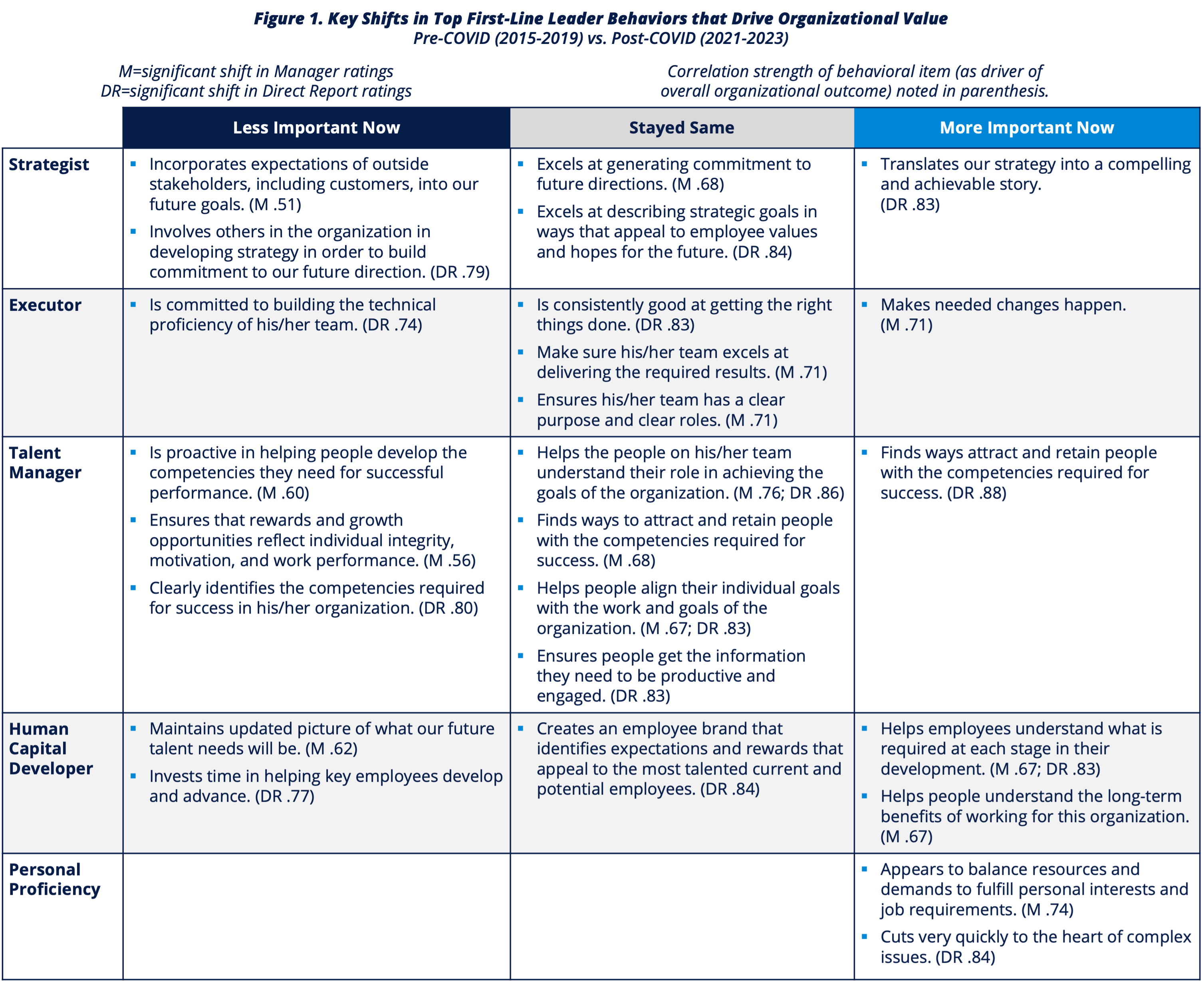What are New Expectations for First-Line Leaders?
Key Takeaways:
- Despite their number and importance, first-line leaders receive limited attention, highlighting a gap in recognition of their crucial role in organizational success.
- Expectations for first-line leaders have evolved post-COVID, emphasizing the need for future-forward thinking, quick decision-making, openness to feedback, and a focus on team well-being.
- Challenges in developing first-line leadership include: promotion without adequate training, intensified pressures faced by leaders post-COVID, and managing remote and stressed teams with fewer resources.

What are New Expectations for First-Line Leaders?

Related Insights
On average, first-line leaders—or the leaders in an organization who are the direct managers of individual contributors—represent 60 percent of manager populations, lead 80 percent of the employees in an organization, oversee production and services, and often create the customer experience.
Yet, despite their critical role, little attention has been paid to identifying what good first-line leadership looks like after the disruptions of recent years and how to help these leaders build the skills to succeed in today’s world.
What are the challenges of building strong first-line leadership?
Many first-line leaders are promoted to a leader/manager role based on their prior individual contributions or subject-matter expertise. They may be given a short introduction to management processes, but that minimal training is rarely enough to help new managers transition to developing and leading a team that consistently and successfully delivers on strategy.
Additionally, the pressures and challenges for first-line leaders have dramatically increased post-COVID. These first-line leaders are being asked to do more with less money and with team members who are new to their teams—teams who are often working remotely, not engaged, and under record levels of stress. Recent research by Gallup and Achievers Workforce Institute indicates that those pressures are impacting first-line leaders and their teams’ engagement, intent to stay, productivity, and well-being. This research also suggests that as much as 72 percent of an organization’s workforce is less engaged, more likely to leave, and less productive at work than the 28 percent of employees with more effective leaders.
This data suggests that investing in first-line leaders can have a significant impact on an organization’s ability to deliver on promises to customers, investors, and other key stakeholders.
How have expectations of first-line leaders shifted because of COVID and the subsequent economic, social, technological, and political changes?
Much of what mattered to first-line leaders’ managers five to ten years ago still matters today: building the ability to get things done, focusing on building talent, and creating commitment to future direction. However, the research (as well as qualitative feedback from our clients over the past 18 months) indicates key shifts in which leadership behaviors have high impact and drive strong organizational value in today’s world.
With a database of more than 32,000 leadership behavior ratings collected over the last ten years with the RBL Leadership Code®, we have a strong and current data-based point of view on the formula for effective leadership. With so many opinions about what good leadership looks like, we at RBL want to highlight what the data says matters most—not people’s opinions.
By focusing on the critical few, evidence-based, first-line leader behaviors that are most strongly correlated with organizational outcomes, we hope to ease the way for first-line leaders and those who lead and support them to grow in ways that help deliver strong value for their organizations.
Using the five domains of our foundational Leadership Code model, our research has identified what matters less, the same, or more today for first-line leaders who effectively deliver strong value for their organizations as seen by their managers and direct reports (figure 1).

What do these findings mean for first-line leaders? For those who lead and support them?
The research is clear and compelling: if you are a first-line leader in today’s world, you need different behaviors to be successful than you did even just three years ago. The first-line leaders who think future forward, act quickly, think clearly, and make good decisions amidst complexity; are open to feedback; help their teams align their individual career goals with the organization’s goals; get the right things done; and model well-being will have the strongest organizational impact. If you are a first-line leader or responsible for upgrading first-line leaders, the following are two key shifts to pay attention to.
1. Build your team for the future.
If you are a first-line leader, you have always had to attract and retain the right talent to get the work done, ensure your team’s goals and skills align to the organization’s goals, and help your team be productive and engaged. Those things were and are still critical to success. However, revolutionary technological changes and powerful social changes have fundamentally shifted what employees expect from their organizations.
In today’s world where employees are less committed to organizations and what is expected from them is changing at a faster rate than ever before, first-line leaders must also be able to:
- Personalize work. Help each member of your team see what’s in it for them if they stay. That involves understanding their goals, finding opportunities for them to develop the skills they want and need to succeed, and actively working to help them bridge the gap between where they are right now and where they want to be in their personal career journey.
- Create meaning and hope. Clearly and consistently communicate how the work the people on your team do contributes to goals that are both compelling and achievable. With so much cynicism and pessimism, leaders who sincerely believe in the work they are doing create positive energy that ignites their teams.
- Look ahead. High-value first-line leaders over-index on attracting and retaining talent with the skills their organization needs to be successful into the future. The challenges of the COVID era led to an emphasis on empathy from leaders. What your team needs is for you to not only lead for today but to anticipate how to be prepared for tomorrow and build and develop a team that will be prepared to keep winning in the market.
2. Manage competing demands.
The second meta-shift showing up in first-line leader expectations is the ability to navigate the paradox of unending waves of change. Working harder and longer is no longer the recipe for success. Today’s leaders need to think clearly and act quickly, deliver today and be ready for tomorrow, and attend to social goals and deliver financial results. First-line leaders must be able to cut to the heart of these competing demands to prioritize their teams’ most important work and implement the changes that matter most.
The skill of identifying and focusing on key deliverables facilitates the ability to maintain a personal balance, which in turn contributes to the ability to continue to think clearly as well as to foster a positive work environment. These behaviors reinforce and enable one another. First-line leaders who can think clearly can both anticipate and prepare for changes and discern between the superfluous changes and those that will matter for the results their teams deliver.
If you are that first-line leader who will just keep working to get things done because it takes too long, requires too much effort, or is too uncomfortable to make hard decisions and build a team to get done what needs to be done, this point of reflection is for you: What can I reprioritize to maintain personal balance? What actions can I take to ensure I and my team are prioritizing the work that matters most? What can I do to optimize my ability to think clearly and strategically?
See how you are doing on today’s most critical behaviors with the self assessment in figure 2.

If you lead or support first-line leaders, you can lean in and support in several ways. Our leadership research highlights the critical need of focused development efforts for your first-line leaders. Putting talented, productive people into leadership roles with the hope that they can succeed is not enough. What got them to the role (likely as high-performing individual contributors) will not get them to where they need to be as a leader. The “softer” but increasingly critical leadership skills in figure 2 merit and require intentional development.
This research can be used to improve first-line leaders with:
- Regular coaching on how to grow and guide their teams.
- Access to development to help them build their teams for the future and successfully navigate paradox.
- Clear messaging from both their leaders and the organization about priorities, directions, and how the organization sees the work of their team contributing to the goals and direction of the organization.
Most acknowledge that first-line leaders are the backbone of the organization and, hopefully, its future leaders. We know that more can be done to support them in the complex transition from individual contributors to leaders of people and teams, particularly in today’s world. We believe this research provides important, data-based insights on how to build first-line leaders that will deliver exceptional value to employees, customers, investors, and communities.
To discuss how this research can help you build an evidence-based leadership brand and culture that increases value for your stakeholders, contact us to be connected with our leadership development experts.
Download a PDF summary of this research here. For more first-line leadership research insights, click here and here. For mid-level leadership research highlights, click here. For executive leadership research insights, click here.


